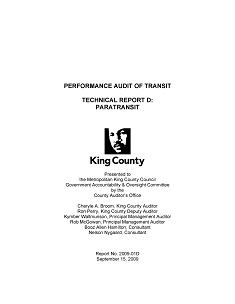Access Paratransit: Action needed to address cost, quality, and equity
June 13, 2017
NEW! Download the latest follow-up report
Access paratransit is a federally mandated program that costs $61 million per year and provides vital mobility services for about 8,000 people. Over the past decade Transit has worked to control the costs of the program. Nevertheless, expenditures have increased while ridership and on-time performance have declined. At the same time, Transit has done little to promote the program to ensure it is reaching historically underserved populations, like people with limited English proficiency. A new contract with its service providers, starting in 2018, provides a unique opportunity for Transit to make changes to paratransit service. We recommend ways to address inefficient practices, improve service, and ensure equitable access to the program.
Status
Of the 17 recommendations:
| DONE | 12 | Recommendations have been fully implemented. Auditor will no longer monitor. |
|---|---|---|
| PROGRESS | 4 | Recommendations are in progress or partially implemented. Auditor will continue to monitor. |
| OPEN | 0 | Recommendations remain unresolved. Auditor will continue to monitor. |
| CLOSED | 1 | Recommendation is no longer applicable. Auditor will no longer monitor. |
Summary
Access provided nearly 900,000 rides to over 8,000 residents in 2016. These rides let individuals who are unable to use fixed-route buses lead more independent lives, taking them to work, run errands, meet friends, and get medical care. The Americans with Disabilities Act mandates this service in order to ensure that people with disabilities have comparable transportation choices.
Transit spends $61 million, or 9 percent of its budget, on Access paratransit services. Given the high cost of this service, and the important role it plays in the lives of its customers, it is important that Transit makes sure that the service is provided as efficiently and effectively as possible.
King County is home to 196,000 people with disabilities, a third of whom are people of color, and many of whom have limited English proficiency. Government policies and programs have historically underserved these groups. King County’s Equity and Social Justice Strategic Plan recognizes that not all people are on equal footing and advocates for a proactive service focused on people and places where needs are greatest.
Transit has implemented several efforts to control costs of paratransit services, like expanding the Community Access Transportation (CAT) program, and training people with disabilities to use the fixed-route system. But certain legacy practices, such as a reliance on large vans running routes with few or no passengers, contribute to inefficiencies. Transit lags behind other transit agencies in improving the flexibility of paratransit service by providing more rides on more efficient alternatives, such as taxis.
We also found areas of concern related to customer service, especially trip length, early drop-offs, and a lack of payment options. About half of all respondents to Transit’s recent customer survey said they were dissatisfied with the amount of time it takes to travel on Access. We found that some trips are longer on paratransit than they would have been on the fixed-route system, contrary to Federal Transit Administration guidelines. In addition, paratransit users lack some of the options for paying for services that are available to fixed-route passengers.
Information from several sources indicate that substantial barriers to using Access exist for certain populations, such as those with limited English proficiency. However, Transit has not availed itself of King County’s equity and social justice tools and does not engage in proactive outreach with historically underserved communities about this program.
We recommend changes intended to improve the flexibility and cost of the service. We also recommend Transit take steps to improve the monitoring of travel time and to provide additional payment options to customers. Transit should take steps to ensure the service is equitable by applying the county’s Equity Impact Review tool to identify gaps and work to increase access to historically underserved populations.
Reports related to this audit
Click on the image below to view related reports.
|
September 15, 2009 |
Audit team
Larry Brubaker, Sean DeBlieck, Megan Ko, and Ben Thompson conducted this audit. If you have any questions or would like more information, please call the King County Auditor's Office at 206-477-1033 or contact us by email KCAO@kingcounty.gov.

 Translate
Translate






